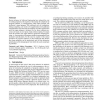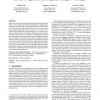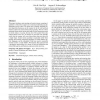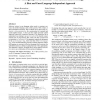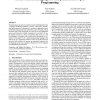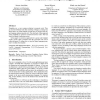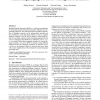114
click to vote
GPCE
2007
Springer
15 years 6 months ago
2007
Springer
Recent advances in Software Engineering have reduced the cost of coding programs at the expense of increasing the complexity of program synthesis, i.e. metaprograms, which when ex...
105
click to vote
GPCE
2007
Springer
15 years 6 months ago
2007
Springer
Large scale software is composed of libraries produced by different entities. Non-intrusive and efficient mechanisms for adapting data structures from one library to conform to AP...
GPCE
2007
Springer
15 years 6 months ago
2007
Springer
This paper introduces new parsing and context-aware scanning algorithms in which the scanner uses contextual information to disambiguate lexical syntax. The parser uses a slightly...
125
click to vote
GPCE
2007
Springer
15 years 8 months ago
2007
Springer
Over the past two decades, Scheme macros have evolved into a powerful API for the compiler front-end. Like Lisp macros, their predecessors, Scheme macros expand source programs in...
128
click to vote
GPCE
2007
Springer
15 years 8 months ago
2007
Springer
Software written in one language often needs to construct sentences in another language, such as SQL queries, XML output, or shell command invocations. This is almost always done ...
GPCE
2007
Springer
15 years 8 months ago
2007
Springer
Programming in an open environment remains challenging because it requires combining modularity, security, concurrency, distribution, and dynamicity. In this paper, we propose an ...
123
click to vote
GPCE
2007
Springer
15 years 8 months ago
2007
Springer
Templates are a very common solution to generate code. They are used for different tasks like rendering webpages, creating Java Beans and so on. Most template systems have no noti...
121
click to vote
GPCE
2007
Springer
15 years 8 months ago
2007
Springer
In this paper, we propose a domain-specific aspect language to prevent the denials of service caused by resource management. Our aspects specify availability policies by enforcin...
102
click to vote
GPCE
2007
Springer
15 years 8 months ago
2007
Springer
Modular Monadic Semantics (MMS) is a well-known mechanism for structuring modular denotational semantic definitions for programming languages. The principal attraction of MMS is ...
GPCE
2007
Springer
15 years 8 months ago
2007
Springer
